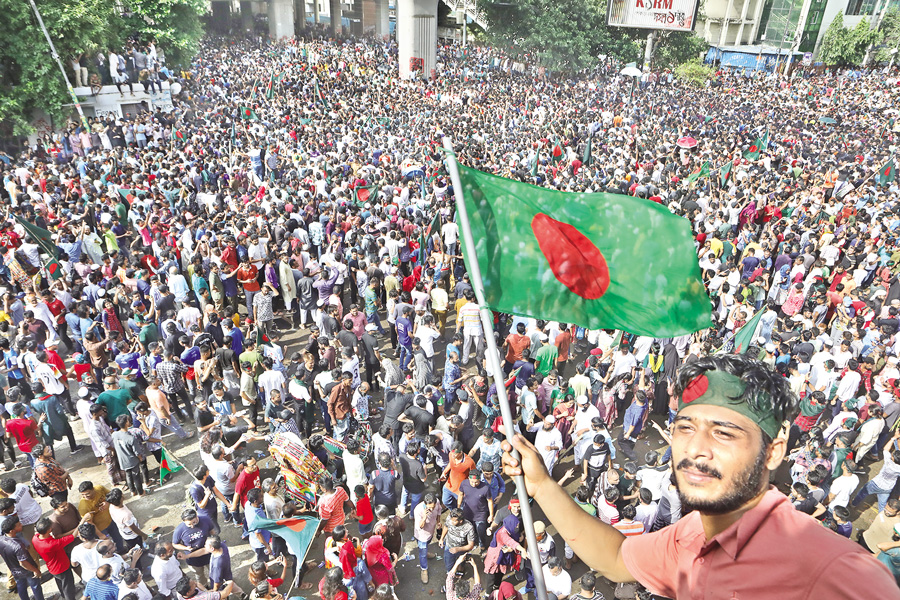A DAY OF RECKONING, DAY OF REJOICING
Nation celebrates Mass Uprising Day today
CA to pronounce July Proclamation at parliament's south-plaza carnival

Published :
Updated :

Celebrations are about to set off today as the day marks the first anniversary of a mass uprising that dealt a dramatic collapse of the authoritarian Sheikh Hasina regime--a historic turning point on Bangladesh's political trajectory.
Chief Adviser of the post-uprising government Prof Muhammad Yunus would roll out the 'July Proclamation' in the afternoon at parliament's south-plaza carnival.
The fifth of August, or 'July 36th' in the uprising calendar, is a day of reckoning as of rejoicing in the nation's fresh start with recast statecraft, as aspired by the martyrs and veterans of the mass movement for equal opportunities for all.
This day last year (2024), the long-reigning prime minister, Hasina, was forced to flee the country following a month-long student-led mass upsurge that swept through cities and towns, shaking off the very foundation of her 15-year rule.
The uprising, sparked by mounting grievances over democratic backsliding, rampant corruption, and the erosion of public institutions, ultimately culminated into her abrupt and ignominious exit, political analysts say.
The fall of the Hasina regime, described by many political analysts as the most significant political event in the post-independence Bangladesh, was a watershed moment that rekindled the nation's aspirations for democracy, justice and accountable governance.
Hasina's long and controversial rule had been marked by the centralisation of power, politicisation of the bureaucracy, curtailment of judicial independence, and the rise of an oligarchic economic order. Allegations of state-sponsored corruption, extrajudicial actions, and repression of dissent had reached a boiling point, eventually erupting into a mass movement that would spell her downfall.
As the news of her departure broke this very day last year, spontaneous celebrations erupted across the country. Streets were flooded with jubilant crowds waving flags, lighting candles, and chanting slogans that echoed a sense of long-awaited liberation. For many, it was a symbolic end to what they saw as years of political suffocation.
The price was, however, so dear. Over 1,500 students and civilians lost their lives and thousands more their limbs or eyes in confrontations with security forces during the mass upheaval. Their sacrifices, mourned and honoured today in commemorative events nationwide, were the catalyst for a national awakening.
In the immediate aftermath of the regime's fall, an interim government led by Nobel-laureate economist Professor Muhammad Yunus was sworn in on August 8, 2024. The transitional administration set out an ambitious roadmap for democratic revival and structural reforms. Several high-powered commissions were formed to draft recommendations on judicial reform, law enforcement, local governance, public administration, and media freedom.
These commissions, comprising eminent jurists, academics, and civil-society leaders, worked expeditiously and submitted far-reaching reform proposals. Their work was widely lauded for both vision and depth. However, the slow pace of implementation has become a source of frustration among reformists and civil-society activists, in particular.
Meanwhile, all activities of the Awami League and its affiliated organisations were suspended few months ago.
One year into the transition, cracks have begun to surface within the broad coalition that had united against Hasina's authoritarianism.
The rise of 'mob justice' in certain regions, in the absence of a fully functioning law-enforcement system, has raised serious concerns about the state of public order.
Another notable development in the post-August-5th period is the emergence of a new political party formed by the student leaders who had spearheaded the July uprising. Their entry into the political arena has altered the traditional balance of power.
One of the major debates on the cusp of transition has been over the timing and extent of reforms needed before holding national elections. While some political groups demanded a complete overhaul of state institutions first, others argued for early elections under minimum reforms.
This impasse was largely resolved following a pivotal meeting in London earlier this year between Chief Adviser Yunus and Tarique Rahman, the de facto leader of the Bangladesh Nationalist Party (BNP). The two reportedly reached a consensus on holding national elections by February 2026--a move that has brought some clarity and optimism to an otherwise uncertain political timeline.
The nation now awaits an official announcement of the election date by the head of the post-uprising government of Bangladesh, Chief Adviser Yunus. Public sentiment, as reflected in recent opinion surveys and media commentary, strongly favours the formation of a stable, elected government to steer the country through its recovery phase.
Investors - both domestic and foreign - have largely held back over the past year, citing concerns about political uncertainty and transitional governance. Business leaders have repeatedly warned that prolonged uncertainty could jeopardise economic-recovery efforts.
Despite the challenges, one of the most commendable achievements of the past year has been the finalisation of the July Proclamation. And the July Charter - a political consensus document---being crafted by the National Consensus Commission-albeit with some notes of dissent is in its final stage. Through extensive consultation with political parties, the Commission has put forward reform blueprints for the legislature, judiciary, and local government that, if implemented, could reshape Bangladesh's political architecture for generations to come.
As the country observes this solemn yet hope-raising anniversary of the changeover, the legacy of the uprising stands as a testament to the power of collective action in the face of repression. It is also a reminder of the responsibilities that now lie ahead - to honour the sacrifices made, to protect the gains won, and to build a democratic future rooted in justice and accountability.
While the journey is far from over, the people of Bangladesh have already demonstrated that when the call of history comes, they are capable of rising to meet it.
mirmostafiz@yahoo.com


 For all latest news, follow The Financial Express Google News channel.
For all latest news, follow The Financial Express Google News channel.